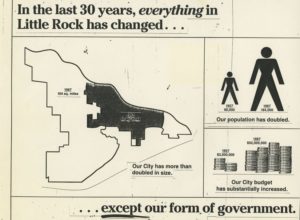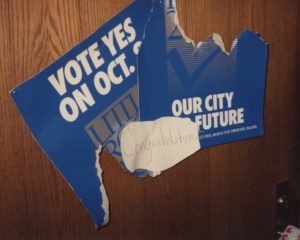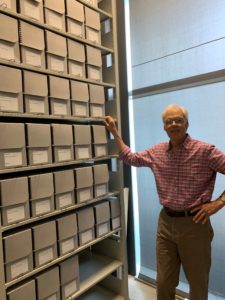calsfoundation@cals.org
Jim Lynch Papers Now Open to Researchers
Jim Lynch is a community activist in Little Rock. Since 1975, he has organized and represented the citizens of the community and of Pulaski County to guide its elected leaders in matters such as taxation, urban growth, environmental protection, and law enforcement.
 James Russell (Jim) Lynch was born on July 12, 1946, in Springfield, Missouri. His family moved to Little Rock in 1959. After graduating from North Little Rock High School, he received a Bachelor of Arts degree in political science from the University of Arkansas in Fayetteville in 1968 and a master’s in public administration from the same school in 1970.
James Russell (Jim) Lynch was born on July 12, 1946, in Springfield, Missouri. His family moved to Little Rock in 1959. After graduating from North Little Rock High School, he received a Bachelor of Arts degree in political science from the University of Arkansas in Fayetteville in 1968 and a master’s in public administration from the same school in 1970.

After serving in the U.S. Army in Vietnam from 1970 to 1972, Lynch returned to Little Rock, working as assistant to the Little Rock city manager from 1972 to 1975 and chief deputy to the Pulaski County Judge from 1977 to 1978. Lynch then was an instructor and researcher for the University of Arkansas at Little Rock and began his involvement in local political issues.

Lynch helped form the Downtown Neighborhood Association in Little Rock in 1984 and the Coalition of Little Rock Neighborhoods in 1990. Both organizations sought to preserve the older neighborhoods of Little Rock, resisting annexation plans that diverted city resources to newly acquired neighborhoods. Lynch also led community groups dealing with tax issues, environmental issues, organization of city government, and city development. He was the first chair of the Racial and Cultural Diversity Commission of Little Rock beginning in 1994, and he was active in an effort to establish the New Party in Little Rock and nationally in the 1990s.
After retiring from UA Little Rock in 2010, Lynch continued to participate in local government activities, both as a citizen and as a member of organized groups. For ten years he has been president of Arkansas Community Institute, a nonprofit research and education group advocating better health care reform, fair treatment of renters, voter registration, and reform of debt collection practices.
***

Jim Lynch’s papers are available to researchers in the Research Room of the CALS Bobby L. Roberts Library; the finding aid is online here. They include organizational papers from the various organizations he led and in which he was involved, including pamphlets, flyers, and other publications. The papers include documents about local elections in which Lynch’s organizations took an interest. They also reflect many of the issues that Lynch and his organizations addressed, from annexation to wastewater. Newspaper coverage of these various concerns is well represented in the collection. A few audio-visual records of community activism and government responses are also included.
Click here for more information on visiting the CALS Roberts Library.
By Steve Teske, Archivist, CALS Roberts Library




